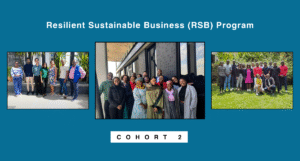By Lucy Muigai, CEO of B Lab Africa
Africa’s small and medium enterprises (SMEs) are the backbone of its economy. Their contribution to job creation, economic growth, and innovation is undeniable. However, these businesses often face significant challenges, including low turnover, high risks, and a focus on short-term goals. This can make sustainability, a long-term commitment, a daunting prospect.
Yet, the green industrial revolution in Africa hinges on the participation of SMEs. How can we encourage these businesses to adopt sustainable practices? Can sustainability actually improve their revenue and profitability?
I am excited to be part of the fireside chat titled “How can small businesses in Africa be encouraged to join the green industrial revolution?” at Economist Impact’s Sustainability Week Africa in Cape Town on October 24-25, 2024.
Some of the ways can we encourage SMEs to adopt sustainable practices are:
- Capacity Building and Training: Technical assistance and training programs, like the Resilient Sustainable Business (RSB) Program, empower SMEs by building financial resilience, optimizing value chains, and fostering innovation. The RSB program equips businesses with tools to manage finances, attract talent, and secure sustainable financing, ensuring they thrive in competitive markets. It also supports green industries, such as renewable energy, sustainable agriculture, and eco-tourism, contributing to a sustainable future. Registration for the 2025 cohort is currently open. Interested participants can register on our website: RSB Program – B Lab Africa.
- Favorable Financial Incentives and Grants: A small-scale food processing SME, facing challenges with energy costs and waste management, could utilize a green grant to invest in solar-powered equipment and sustainable packaging solutions. This would not only reduce operational expenses but also improve product quality and appeal to environmentally conscious consumers, ultimately enhancing the SMEs competitiveness and sustainability.
- Policy and Regulatory Support: Crafting clear environmental regulations and promoting fair trade policies are essential for encouraging small businesses to participate in the green industrial revolution. Clear regulations that are easy to understand and comply with can alleviate the burden on small businesses, while fair trade policies can support the growth of green industries and discourage the import of environmentally harmful products.
By implementing these strategies and more that we will be discussing at Economist Impact’s Sustainability Week Africa, we can create an enabling environment for small businesses to embrace the green industrial revolution. This transition not only benefits the environment but also contributes to economic growth, job creation, and improved livelihoods for millions of people across the continent.
I look forward to discussing these strategies in more detail at the fireside chat and exploring how we can work together to build a greener and more sustainable Africa.




